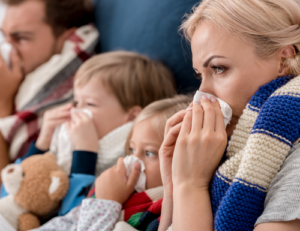Now that flu season is here, it’s important for you to take extra precautions to keep you and your family healthy. These tactics are not foolproof because the flu, RSV, and COVID-19 are infectious viruses, but they can significantly lower the chances of you or a loved one getting sick.
- What Is Flu Season?
- Flu Vaccines Urgent Care in Oxnard
- How to Stop the Spread This Flu Season
- Learn How to Identify Flu Symptoms
- Know When to Seek Urgent Care in Oxnard
- Key Takeaways
What Is Flu Season?
Flu season in California normally starts around October before peaking from December to February. However, since the most recent pandemic, influenza, RSV, and COVID-19 infections have been on the rise. Anyone can catch the flu or experience serious complications that require medical attention. Since the start of this flu season, the California Department of Health (CDPH) has confirmed that the majority of confirmed influenza cases are A (H3N2).
Flu Vaccines Urgent Care in Oxnard
One of the best ways to shore up immunity against the flu and lessen symptom duration and severity is to get vaccinated every year. It’s proven that flu vaccines reduce the number of flu-related hospitalizations and missed work and school days every year.
Flu vaccines are available for everyone six months and older and are highly recommended for those at risk of developing serious complications. However, some people with certain medical conditions should avoid certain influenza vaccine strains. Regardless of your age or health status, discuss your concerns with a medical provider.
Flu vaccinations don’t help much once you’re sick. If you and your family have managed to avoid the flu thus far this year, now is a great time to stop by Solar Urgent Care in Oxnard to get your seasonal flu vaccine. Although critical, the flu vaccination alone is not enough to prevent infection. Here are some precautions you can take to stay healthy this flu season.
How to Stop the Spread This Flu Season
Improve your hygiene. It’s one of the strongest defenses against sickness. Get in the habit of washing your hands with hypoallergenic soap and warm water before and after eating, touching your face, sneezing, coughing, and touching surfaces and other people.
Use hand sanitizer. It’s your best friend, so use it as much as necessary when you are unable to wash your hands with soap and water.
Limit what you touch. Avoid touching people and sharing items. If you must touch shared surfaces or items, wash them with warm water and soap or use a disinfectant wipe to clean them first.
Do not share beverages or food with anyone, not even babies and kids. Encourage your children to wash their hands and avoid sharing foods, toys, beverages, and items with their friends and peers. Flu and respiratory infections tend to run highest in school-aged children.
Cover your mouth with a tissue when coughing or sneezing or into your elbow. Try not to use your hands. Steer clear of individuals who appear sick. Avoid crowded environments and places where infection rates are likely high; this includes schools and daycares.
Stay home to rest properly if you feel sick. Resting and practicing self-care when sick can help you recover quicker and keep symptoms from becoming unmanageable or more serious. Staying home also allows you to avoid spreading your illness to others, including your loved ones.
Treat symptoms to alleviate discomfort so you can rest better and recover quickly. Mild flu symptoms are treatable at home with over-the-counter pain medicines, drinking lots of water and fluids with electrolytes, and sleeping. If symptoms become unmanageable or worsen, head to urgent care in Oxnard for an assessment and prescription for antiviral flu meds to help lessen symptom severity and duration and reduce the chances of reinfection and additional infections.
Practice social distancing to reduce your exposure to infectious germs when indoors. Many people do not stay home when they are sick. Also, not everyone experiences the same symptoms. Also, flu, COVID-19, and RSV symptoms can occur suddenly. Try to maintain a safe distance of four to six feet from others to play it safe and limit your risk exposure.
Mask up to reduce your chances of getting sick, especially when you’re indoors and in crowded settings. Face masks serve as a barrier against germs and bacteria. They are extremely helpful when infectious germs are floating about and help keep you from breathing them in. Face masks also help protect others from getting sick from you.
Get enough rest to help beef up your immune system against the flu. With COVID-19, RSV, and the common cold, your body needs all the help it can get to keep from getting sick. It is possible to have multiple respiratory illnesses at the same time. Having one virus also significantly increases your risk of catching additional respiratory infections. Try to get at least eight to nine hours of sleep each night, so your body is fully recharged each day to help counter the effects of any exposure.
Improve your diet. Eat well to help boost your immunity against the flu and other infectious illnesses this flu season.
Drink more fluids to avoid dehydration and keep the mucous membranes in your airways moist. Proper hydration is necessary to keep mucous membranes inside of your nose, mouth, and throat moist so they can filter out germs and pathogens that can make you sick. Increasing your fluid intake also helps your lymphatic system fight infection and remove toxins, bacteria, viruses, and waste from your body.
Dress appropriately for the weather and your health. Over and underdressing is taxing to the body and can reduce its ability to fight off infection.
Regularly clean and disinfect all common areas in your home and workplace. This includes doorknobs, handles, phones, faucet handles, microwave or fridge handles, remote controls, and shopping carts.
Learn How to Identify Flu Symptoms

- Fever
- Fatigue
- Headache
- Sore throat
- Body aches
- Chills
- Cough
- Sneeze
- Nasal Congestion
The common cold also causes similar symptoms, but they are much milder. It’s important to wear a mask and do what you can to avoid spreading the illness to others. The flu is contagious, and you can still spread it to others five to seven days after symptoms clear up.
Know When to Seek Urgent Care in Oxnard
If you or a loved one experiences shortness of breath, chest pain, confusion, or a sudden worsening of symptoms, head to the nearest emergency room. If symptoms are mild but linger longer than one week, head to an urgent care in Oxnard for antiviral treatment.
Keep in mind that COVID, RSV, and sinus infection rates are up tremendously as well. Even if you’ve had COVID in the past or are vaccinated and boosted, you are still at risk of infection.
RSV doesn’t just impact young children, it affects adults of all ages too. There is no vaccine for RSV.
In adults, symptoms are similar to the common cold and influenza, yet symptoms are managed at home with rest and self-care. In young children, RSV is not so easy to spot and symptoms may not appear at the same time.
RSV can become dangerous for young children and babies who often only show signs of increased irritability, difficulty breathing, and lethargy. Medical care is necessary for symptoms that don’t go away within one to two weeks to prevent complications like pneumonia and respiratory failure.
There are vaccines for COVID and the flu, however. Sinus infections are common and can become more severe due when additional infections are present. Those who experience severe, worsening, or prolonged sinus infections should seek medical treatment.
Anyone experiencing cold, flu, RSV, or COVID-like symptoms should head to urgent care in Oxnard to get tested, diagnosed, and treated for their condition so they can keep themselves and their loved ones healthy.
Key Takeaways
The best ways to keep you and your family safe against the flu and other common wintertime illnesses are to get vaccinated, practice self-care to keep the immune system strong, use good hygiene and proven practices to stop the spread, and know how to identify the symptoms of infection and when to go to an urgent care in Oxnard or emergency room.
Visit Solar Urgent Care in Oxnard whenever you or a family member is sick or injured. Visit our website to learn about the medical care and services we provide.








